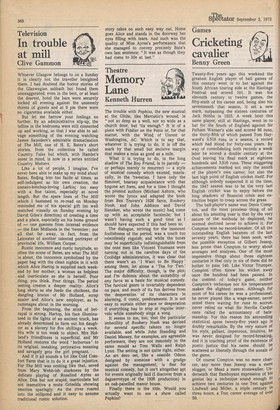Theatre
Memory Lane
Kenneth Hurren
The trouble with Popkiss, the new musical at the Globe, like Mercutio's wound, is "not so deep as a well, nor so wide as a church door, but 'tis enough." It is of a piece with Fiddler on the Patio or, for that matter, with the Wind of Unrest or Washington, AC. Which is to say that, whatever it is trying to do, it is off the mark by that small but decisive margin that makes a miss as good as a mile.
What it is trying to do, in the long shadow of The Boy Friend, is to parody — or perhaps merely to resurrect — a style of musical comedy which existed, maniacally, in the 'twenties. I have only the flimsiest, hearsay acquaintance with that bygone art form, and for a time I thought the present authors (Michael Ashton, who wrote the lyrics and adapted the book from Ben Travers's 1926 farce, Rookery Nook, and John Addison and David Heneker, who wrote the music) had come up with an acceptable facsimile; but I wasn't having such a good time as I should have expected if this had been so.
The dialogue, striving for the innocent foolishness of the period, was a touch too relentlessly roguish; and while the tunes may be superficially indistinguishable from the ones men like Vincent Youmans were turning out in the carefree days of the Coolidge administration, it was clear that there wasn't an 'I Want to Be Happy' among them, let alone a 'Tea for Two.' The major difficulty, though, is the plot; and I'm dubious about the suitability of any farce as a basis for musical comedy. The farcical genre is invariably dependent on pace, and much of its fun derives from the desperation of its characters in alarming, if comic, predicaments. It is not easy to sustain either pace or desperation if everything has to stop at regular intervals while somebody sings a song.
It seems to me, too, that the particular imbecility of Rookery Nook was devised for several specific talents no longer available, and while John Standing and Daniel Massey, for examples, are agreeable performers, they are not remotely in the same mould as Tom Walls and Ralph Lynn. The setting is not quite right, either. An art deco set, like a seaside Odeon designed by someone with a grudge against the management, is fine for musical comedy, but it isn't altogether apt for events originally laid (I discover from a daguerrotype of the 1926 production) in an oak-panelled manor house.
Finally there is the title. Would you actually want to see a show called Popkiss?






































 Previous page
Previous page